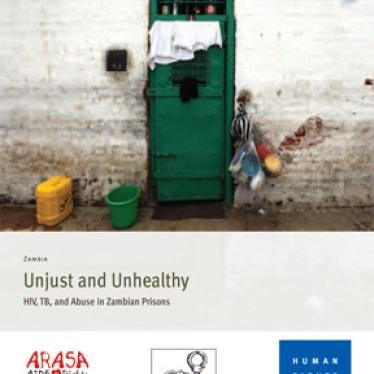Zambia's policy of free universal HIV treatment and wide availability of tuberculosis drugs show an impressive commitment to public health. But an important group has been left out in Zambia's fight against these diseases-prisoners.
Prisoner health is public health. And right now, conditions inside Zambia's prisons are a threat to all Zambians.
Diseases move quickly into and out of prisons. Prisoners come from-and almost always return to-the community: Lusaka Central Prison alone receives 20 to 40 new inmates every day, and every week dozens of prisoners finish their sentences and leave. Prison officers and visitors also come and go, creating more links to the community.
Over the last six months, Human Rights Watch, the AIDS and Rights Alliance for Southern Africa, and the Prisons Care and Counselling Association were granted access by the Ministry of Home Affairs and Zambia Prisons Service to six prisons-Lusaka Central, Mukobeko Maximum Security, Kamfinsa, Mwembeshi, Mumbwa, and Choma-to research prison health conditions and related human rights violations. We interviewed nearly 250 prisoners and more than two dozen prison officers. What we found was shocking.
Prisons are a breeding ground for disease and injustice. Zambian prisons are massively over capacity, and prisoners are frequently abused and denied health care. Prisoners, weak and malnourished, told us how they were packed together, forced to sleep seated or in shifts in dark, cramped, and airless cells. They drink dirty water and have no soap to wash their filthy blankets. In some prisons, for punishment, prisoners are placed, naked, in a small, dark cell with water on the floor, minimal food, and no toilet facilities. Under these conditions, tuberculosis and other infectious diseases spread quickly.
In 1999, the last time a survey was conducted, more than one in four prisoners were found to be infected with HIV. Between 1995 and 2000, a reported 2,397 inmates and 263 prison staff died from AIDS-related illnesses. The medical directorate of the Zambia Prisons Service reports that TB is the leading cause of death in prisons, but it remains largely unmeasured and unaddressed.
There is practically no medical care in Zambia's prisons. As of October 2009, the Zambia Prisons Service employed 14 health care workers-only one a doctor-to serve 15,300 prisoners. Only 15 of Zambia's 86 prisons have any health clinic or sick bay at all. Those 15 sick bays often have little capacity beyond occasionally distributing mild pain or fever medications. Decisions by officers and inmates without medical training, lack of personnel, inadequate transport, and security fears all keep prisoners from gaining access to medical care outside of the prisons, in some cases for days or weeks after they become sick.
Even if prisoners get treatment, there are no services to make sure that former prisoners continue on treatment. There is no way even for prisoners to get a copy of their medical records. This means that when prisoners leave prison, those on treatment may get cut off and those who need treatment may never get it.
While the health of the community is threatened by poor conditions and medical care in Zambia's prisons, the health of prisoners is also endangered every day. And who are these prisoners? We spoke to children as young as 15, adults as old as 80. Zambian prisons house more than one hundred infants under the age of four and around 300 youth between eight and 18 years. More than a third of Zambia's prisoners have never been found guilty and sentenced for any crime. Some are detained for more than five years waiting for their case to be resolved. Others wait even longer to have the courts hear their appeal. Meanwhile they risk being exposed to serious, life-threatening, disease.
Improving health care services and reducing exposure to HIV/TB requires more than just an investment in health. More fundamentally, the Zambian government needs to reform the criminal justice system. Arbitrary arrests, the lack of bail availability and legal representation, and delays that unjustifiably keep people in prison for long periods all contribute to the problem. Non-custodial pre-trial and sentencing alternatives should be used more frequently, particularly for juveniles. The country needs to end arbitrary arrests and expand use of parole. Until criminal justice system failures are addressed, investments in health will not be able to keep up with the problems created by these failures.
Reflecting on his time at Lusaka Central Prison, Rodgers, a 42 year-old inmate who had been awaiting trial for four years, said to us, "Justice delayed is justice denied." A well-worn phrase, but worth considering. The government of Zambia needs to ensure both that justice is not denied and that health-for prisoners and for all Zambians-is protected.







